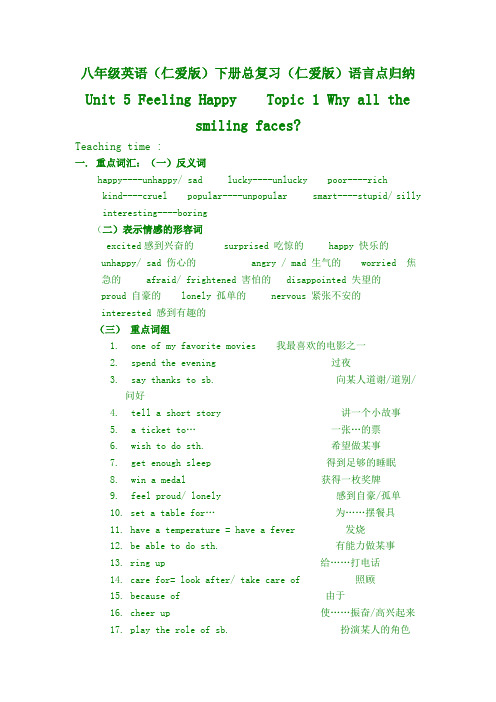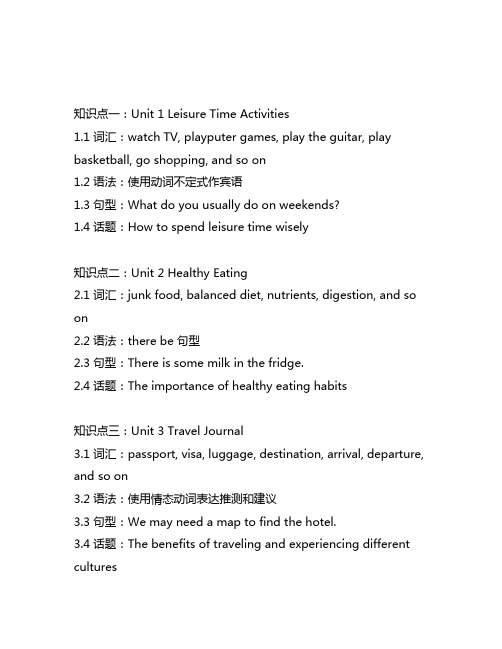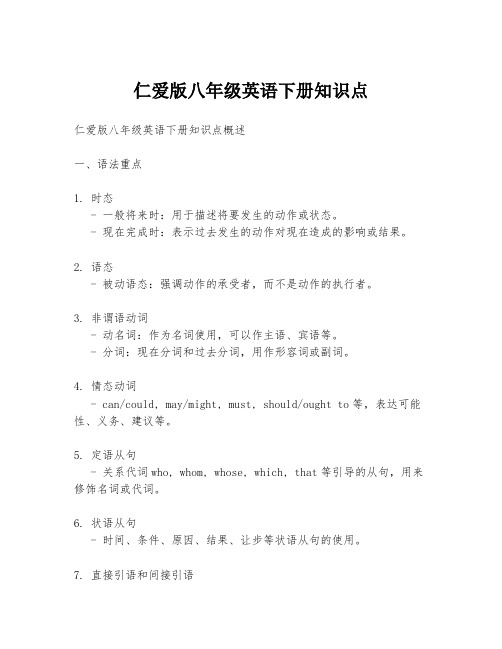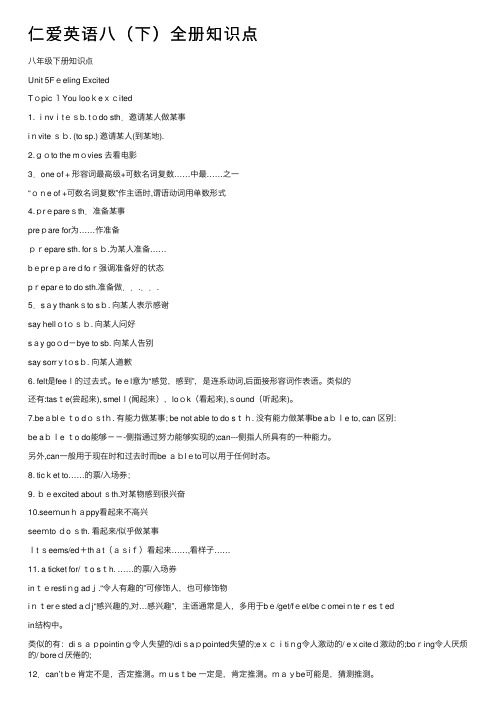仁爱版八年级英语下册必考知识点归纳完整版
仁爱版初二下册英语知识点归纳

仁爱版初二下册英语知识点归纳仁爱版初二下册英语知识1短语归纳1.make fried rice做炒米2.be proud oftake pride in 为……感到骄傲3.well done 做得好4.add…to… 把……加到……5.cut up 切碎cut…into… 把……切成……cut down 砍伐,降低,减少6.help oneself to sth. 请自便7.for the first time 第一次8.table manners 餐桌礼仪9.sit down at the table 坐在桌子旁10.eat up 吃光use up 用光11.drink to sb./sth.为某人/某事干杯12.junk food 垃圾食品13.pick up 捡起,拾起;搭乘14.set the table 摆放餐具15.remember to do sth. 记得要去做某事remember doing sth. 记得做过某事16.point at/to 指向……词性转换1.cook v.烹饪,做饭n.[C]厨师cooker n.炊具2.health n.健康healthy adj.healthily adv.3.polite adj.礼貌的impolite adj.不礼貌的4.noise n.噪音,吵闹声noisy adj.吵闹的,聒噪的noisily adv.5.quiet adj.安静的,寂静的quietly adv.6.eating habits 饮食习惯重点句型1.It’s very kindof you.你真是太善良了(It’s +adj.+of sb. to do sth.)2.What do I need to do after that?接下来我需要做什么?3.I’m not sure whether I can cook it well.我不确定我是否能把它做好。
4.Would you like me to help you?你愿意让我帮助你吗?5.Practice makes perfect.熟能生巧。
最新仁爱版八年级英语下册总复习知识点归纳大全(15页)

八年级英语(仁爱版)下册总复习(仁爱版)语言点归纳Unit 5 Feeling Happy Topic 1 Why all thesmiling faces?Teaching time :一.重点词汇:(一)反义词happy----unhappy/ sad lucky----unlucky poor----rich kind----cruel popular----unpopular smart----stupid/ silly interesting----boring(二)表示情感的形容词excited感到兴奋的 surprised 吃惊的 happy 快乐的unhappy/ sad 伤心的 angry / mad 生气的 worried 焦急的 afraid/ frightened 害怕的 disappointed 失望的proud 自豪的 lonely 孤单的 nervous 紧张不安的interested 感到有趣的(三)重点词组1.one of my favorite movies 我最喜欢的电影之一2.spend the evening 过夜3.say thanks to sb. 向某人道谢/道别/问好4.tell a short story 讲一个小故事5. a ticket to… 一张…的票6.wish to do sth. 希望做某事7.get enough sleep 得到足够的睡眠8.win a medal 获得一枚奖牌9.feel proud/ lonely 感到自豪/孤单10.set a table for… 为……摆餐具11.have a temperature = have a fever 发烧12.be able to do sth. 有能力做某事13.ring up 给……打电话14.care for= look after/ take care of 照顾15.because of 由于16.cheer up 使……振奋/高兴起来17.play the role of sb. 扮演某人的角色18.be on 上演; 放映19.at first 首先20.fall into 落入21.be afraid of doing sth. 害怕做某事22.in/at the end = at last 最后23.go mad 发疯e into being 形成25.be full of 充满…26.be popular with… 受……喜爱27.make peace 制造和平28.end/begin with… 以……结尾/开始二.重点句型及重点语言点2. Because he can’t get a ticket to The Sound of Music. 因为他没有买到《音乐之声》的票.to 表“的”,常见的搭配如下:a ticket to The Sound of Music 一张《音乐之声》的票the answer to the question 问题的答案the key to the door 门的钥匙the way to…去…..的路1. How nice! 真是太好了!What a shame! 真可惜!What bad news! 多糟的消息!这三句全都是感叹句.它们的结构为:1)How + adj./ adv. + 主语 + 谓语! 如: How moving the movie is! How fastthe boy runs!2)What + a/an + adj. + n. (可数名词的单数) + 主语 + 谓语! 如: What abig apple (it is)!3)What + adj. + n.(可数名词的复数或不可数名词) + 主语 + 谓语! 如:What interesting stories (they are)! What hard work( it is)!4.I’ll ring up Michael later. 稍后我打电话给迈克.ring up sb. = call/ ring/ phone sb. = give sb. a ring/ call/ telephone = make a telephone to sb.当宾语为代词时, 只能放中间.如: ring me/him/her up3. I think Mr. Lee likes it very much and really wishes to watch it. 我认为李老师非常喜欢它而且的确想去看. wish/ hope to do sth.希望做某事与 wish 相关的结构还有: wish/ hope + that引导的从句;如:I wish/ hope (that) we will win.我们可以说wish sb. to do sth. 而不能说hope sb. to do sth.;6. I’m sure Mr. Lee will be surprised and happy! 我确信李老师会很惊奇也很高兴!be surprised “感到惊奇的”, 主语一般为人.be surprising “令人惊奇的”, 主语一般为物.类似的有:interested/ interesting; excited/ exciting; bored/ boring 5.…since they were not able to go.……既然他们不能去.can与be able to 二者都表“能;会”,在指“一般能力”时,常互换。
八年级下册仁爱英语知识点

八年级下册仁爱英语知识点八年级下册仁爱英语知识点大全go out for dinner 出去吃饭stay out late 在外面待到很晚go to the movies 去看电影get a ride 搭车work on 从事finish doing sth. 完成做某事clean and tid y 干净整洁do the dishes 洗餐具take out the rubbish 倒垃圾fold your/the clothes 叠衣服sweep the floor 扫地make your/the bed 整理床铺clean the livng room 打扫客厅no problem 没问题welcome sb. 欢迎某人come home fro m school/ work放学/下班回家throw down 扔下sit down 坐下come over 过来take sb. for a walk 带某人去散步all the time 一直;总是all day/evening 整曰/夜do housew ork 做家务shout back 大声回应walk away 走开.share the housework 分担家务a com fortable home 一个舒适的家in surprise 惊讶地get som ething to drin k 拿点喝的东西watch one show 观看一个节目hang out 闲逛pass sb. sth. 把某物传给某人lend sb. sth. 把某物借给某人get sth. wet 使某物弄湿hate to do sth. 讨厌做某事do chores 做杂务help sb. (to ) d o /with sth帮助某人干某事bring a tent带顶帐篷来buy some snacks买些小吃go to the store去商店invite sb. to a party邀请某人参加聚会make sb. do sth. 使某人做某事enough stress足够的压力awaste of tim e浪费时间in order to为了get good grades取得好成绩m ind doing sth. 介意做某事depend on依赖;依靠develop c h ild re n ’ s independence发展孩子的独立性look after/take care of 照顾;照看do one’ s part in (doin g ) sth.做某人分内的事八年级英语Unit3单元知识点:重点句型1. Could you please…..do sth. ?Could you please clean your room?你能整理一下你的房间吗?2. I have to do some work.我必须干些活。
仁爱版英语八年级下册知识点汇总(最新最全)

Unit5 feeling happyTopic 1 why all the smiling faces?一、重点词汇1、cruel 残忍的2、 silly 傻的3、smile 微笑4、rich 富裕的5、proud 骄傲的6、taste 品尝7、smell 问起来 8、set 设置 9、able 能够10、since 自从。
11、lively 活泼的 12、play 玩13、mad 发疯的 14、please 请;令人高兴的 15、marry 结婚16、main 主要的 17、role 角色 18、express 表达19、culture 文化 20、peace 和平二、重点短语1 Why all the smiling faces? 为什么你们都笑容满面。
2 You look so excited. 你看起来很兴奋。
3 invite/ ask sb to do sth 邀请某人做某事4 one of 其中之一5 prepare sth for sb= get sth ready for sb 为某人准备好某事6 say thanks / hello / sorry / goodbye to sb 向某人说声谢谢/ 你好/抱歉/再见7 None of 没有一个8 What a shame / pity. 真遗憾。
9 get the ticket to = buy the ticket for 买到。
的票10 not at all 一点也不11 What do you like best? = What’s your favorite? 你最喜欢什么?12 be proud of = take pride in 为。
感到骄傲13 be worried about = worry about 为。
而担心,担心。
14 wait in line 排队等候15 be pleased with sb = be satisfied with sb 对某人感到满意be pleased at sth 为某事而感到高兴16 taste delicious 尝起来美味 smell terrible 闻起来恶心 17 set the table 摆放餐具18 have a temperature = have a fever 发烧19 I hope everything goes well. 我希望一切进展顺利。
八下仁爱版英语知识点

八下仁爱版英语知识点
仁爱版八年级英语教材主要涵盖以下知识点:
1. 语法知识点:
- 动词的时态和语态
- 名词的单数和复数形式
- 形容词和副词的比较级和最高级
- 介词的用法
- 情态动词的用法
- 动名词和不定式的用法
- 句子的结构和类型
- 定语从句和状语从句的用法
2. 词汇知识点:
- 常用的词汇和短语
- 学科词汇和专业术语
- 同义词和反义词
3. 阅读技巧和能力:
- 阅读理解的技巧和策略
- 阅读文章的主旨和细节
- 阅读文章的推理和判断
- 阅读文章的段落组织和逻辑关系
4. 写作技巧和能力:
- 书信和邮件的写作格式和常用表达方式
- 叙述性、说明性和议论性文章的写作技巧
- 写作素材和论据的收集和组织
5. 口语表达能力:
- 日常对话和交流的常用表达方式
- 询问和提供信息的技巧
- 表达意见和观点的技巧和策略
6.听力技能和能力:
- 听懂和理解日常对话和广播新闻
- 听取信息和指示的能力
- 听写和填写正确信息的能力
以上是仁爱版八年级英语教材的主要知识点,希望对你有所帮助。
英语仁爱版八年级下册知识点总结

知识点一:Unit 1 Leisure Time Activities1.1 词汇:watch TV, playputer games, play the guitar, play basketball, go shopping, and so on1.2 语法:使用动词不定式作宾语1.3 句型:What do you usually do on weekends?1.4 话题:How to spend leisure time wisely知识点二:Unit 2 Healthy Eating2.1 词汇:junk food, balanced diet, nutrients, digestion, and so on2.2 语法:there be 句型2.3 句型:There is some milk in the fridge.2.4 话题:The importance of healthy eating habits知识点三:Unit 3 Travel Journal3.1 词汇:passport, visa, luggage, destination, arrival, departure, and so on3.2 语法:使用情态动词表达推测和建议3.3 句型:We may need a map to find the hotel.3.4 话题:The benefits of traveling and experiencing different cultures知识点四:Unit 4 Making the News4.1 词汇:reporter, headline, journalist, article, interview, and so on4.2 语法:使用虚拟语气表示假设4.3 句型:If I were you, I would follow the latest news.4.4 话题:The role of media in shaping public opinion——《英语仁爱版八年级下册知识点总结》1. 介绍英语作为一门国际通用语言,对于提高个人综合素质和竞争力具有重要意义。
仁爱版八年级英语下册知识点

仁爱版八年级英语下册知识点仁爱版八年级英语下册知识点概述一、语法重点1. 时态- 一般将来时:用于描述将要发生的动作或状态。
- 现在完成时:表示过去发生的动作对现在造成的影响或结果。
2. 语态- 被动语态:强调动作的承受者,而不是动作的执行者。
3. 非谓语动词- 动名词:作为名词使用,可以作主语、宾语等。
- 分词:现在分词和过去分词,用作形容词或副词。
4. 情态动词- can/could, may/might, must, should/ought to等,表达可能性、义务、建议等。
5. 定语从句- 关系代词who, whom, whose, which, that等引导的从句,用来修饰名词或代词。
6. 状语从句- 时间、条件、原因、结果、让步等状语从句的使用。
7. 直接引语和间接引语- 引述别人的话,注意时态、人称和指示代词的变化。
二、词汇与短语1. 常用词汇- 描述人物特征的形容词,如kind, honest, creative等。
- 描述日常活动的动词短语,如clean up, take out, give up等。
- 与学校生活相关的名词,如classroom, library, project等。
2. 短语动词- look after, turn off, get along with等。
3. 常见搭配- 形容词与名词的搭配,如good habits, heavy rain等。
- 动词与副词的搭配,如finish quickly, study hard等。
三、阅读理解1. 抓住文章主旨- 通过阅读标题、首段和结尾段,快速把握文章大意。
2. 推理判断- 根据上下文线索,推断生词或隐含信息的含义。
3. 细节理解- 通过关键词定位,准确获取文章中的具体信息。
四、写作技巧1. 句型多样性- 使用复合句、并列句等多样化的句型,丰富文章结构。
2. 逻辑连贯- 使用连接词,如however, therefore, moreover等,使文章结构清晰、逻辑性强。
仁爱英语八(下)全册知识点

仁爱英语⼋(下)全册知识点⼋年级下册知识点Unit 5Feeling ExcitedTopic 1You lookexcited1. invitesb. todo sth.邀请某⼈做某事invite sb. (to sp.) 邀请某⼈(到某地).2.goto the movies 去看电影3.one of + 形容词最⾼级+可数名词复数……中最……之⼀“one of +可数名词复数”作主语时,谓语动词⽤单数形式4.preparesth.准备某事prepare for为……作准备prepare sth. forsb.为某⼈准备……bepreparedfor强调准备好的状态prepareto do sth.准备做......5.say thanksto sb. 向某⼈表⽰感谢say hellotosb. 向某⼈问好say good-bye to sb. 向某⼈告别say sorrytosb. 向某⼈道歉6. felt是feel的过去式。
feel意为“感觉,感到”,是连系动词,后⾯接形容词作表语。
类似的还有:taste(尝起来), smell(闻起来),look(看起来),sound(听起来)。
7.beableto dosth. 有能⼒做某事; be not able to do sth. 没有能⼒做某事be able to, can 区别:be able to do能够---侧指通过努⼒能够实现的;can---侧指⼈所具有的⼀种能⼒。
另外,can⼀般⽤于现在时和过去时⽽be ableto可以⽤于任何时态。
8. ticket to……的票/⼊场券;9. beexcited about sth.对某物感到很兴奋10.seemunhappy看起来不⾼兴seemto do sth. 看起来/似乎做某事It seems/ed+that(asif)看起来……,看样⼦……11. a ticket for/ to sth. ……的票/⼊场券interesting adj.“令⼈有趣的”可修饰⼈,也可修饰物interested adj“感兴趣的,对…感兴趣”,主语通常是⼈,多⽤于be/get/feel/becomeinterestedin结构中。
- 1、下载文档前请自行甄别文档内容的完整性,平台不提供额外的编辑、内容补充、找答案等附加服务。
- 2、"仅部分预览"的文档,不可在线预览部分如存在完整性等问题,可反馈申请退款(可完整预览的文档不适用该条件!)。
- 3、如文档侵犯您的权益,请联系客服反馈,我们会尽快为您处理(人工客服工作时间:9:00-18:30)。
仁爱版八年级英语下册必考知识点归纳完整版不强调偏、难、怪,而着力选择学生最容易混淆,最容易出错的知识点和考点。
充分发挥课堂的系统性、直观性功能,将语法知识进行系统化的总结和讲解,把一些平时回避或者说不清楚的问题说得透彻清楚,使学生不仅能够记忆并运用各语法知识,更能形成一定的语法思维逻辑,灵活的掌握和理解语法,而不至于死记硬背。
详尽列举和分析解题技巧,使学到的语法知识活起来。
成绩快速上升sixty-eighty分。
Unit 5 Topic 1一. 重点词汇:(一)反义词happy----unhappy/sad lucky----unlucky poor----rich kind----cruel popular----unpopular smart----stu pid/ silly interesting----boring(二)表示情感的形容词excited感到兴奋的surprised 吃惊的happy 快乐的unhappy/ sad 伤心的angry / mad 生气的worried 焦急的afraid/ frightened 害怕的disappointed 失望的proud 自豪的lonely 孤单的nervous 紧张不安的interested 感到有趣的(三)重点词组1. one of my favorite movies 我最喜欢的电影之一2. spend the evening 过夜3. say thanks / goodbye/ hello to sb. 向某人道谢/道别/问好4. tell a short story 讲一个小故事5. a ticket to…一张…的票6. wish to do sth. 希望做某事7. get enough sleep 得到足够的睡眠8. win a medal 获得一枚奖牌9. feel proud/ lonely 感到自豪/孤单10. set a table for…为……摆餐具11. have a temperature = have a fever 发烧12. be able to do sth. 有能力做某事13. ring up 给……打电话14. care for= look after/ take care of 照顾15. because of 由于16. cheer up / cheer on 使……振奋、高兴起来/ 为……喝彩、加油17. play the role of sb. 扮演某人的角色18. be on 上演; 放映19. at first 首先20. fall into 落入21. be afraid of doing sth. 害怕做某事22. in/at the end = at last 最后23. go mad 发疯24. come into being 形成25. be full of 充满…26. be popular with…受……喜爱27. make peace 制造和平28. end/begin with…以……结尾/开始二. 重点句型及重点语言点1. How nice! 真是太好了!What a shame! 真可惜! =That’s too bad!What bad news! 多糟的消息!这三句全都是感叹句.它们的结构为:1) How + adj./ adv. + 主语+ 谓语! 如: How moving the movie is! How fast the boy runs!2) What + a/an + adj. + n. (可数名词的单数) + 主语+ 谓语! 如: What a big apple (it is)!3) What + adj. + n.(可数名词的复数或不可数名词) + 主语+ 谓语! 如:What interesting stories (they are)! What hard work( it is)!2. B ecause he can’t get a ticket to The Sound of Music. 因为他没有买到《音乐之声》的票.to 表“的”,常见的搭配如下:a ticket to The Sound of Music 一张《音乐之声》的票the answer to the question 问题的答案the key to the door 门的钥匙the way to…去…..的路3. I think Mr. Lee likes it very much and really wishes to watch it. 我认为李老师非常喜欢它而且的确想去看. wish/ hope to do sth.希望做某事与wish 相关的结构还有: wish/ hope + that引导的从句; 如:I wish/ hope (that) we will win.我们可以说wish sb. to do sth. 而不能说hope sb. to do sth.;4. I’ll ring up Michael later. 稍后我打电话给迈克.ring up sb. = call/ ring/ phone sb. = give sb. a ring/ call/ telephone = make a telephone to sb.当宾语为代词时, 只能放中间.如: ring me/him/her up5.…since they were not able to go. ……既然他们不能去.can与be able to 二者都表“能;会”,在指“一般能力”时,常互换。
如:He can/is able to work out the problem. 他能算出这道难题.区别: can 只有现在式和过去式(could),没有数的变化;而be able to 有时态及数的变化. 如: I/ She couldn’t swim three years ago, but now I / She can .三年前,我/她不会游泳, 但现在我/她能.I will be able to see him next week. 下周, 我将会看到他.They were /He was able to climb the mountain, but now they aren’t/ He wasn’t.They’re / He was too old. 他们/他过去能爬得上这座山, 但现在不能. 他们/他太老了.6. I’m sure Mr. Lee will be surprised and happy! 我确信李老师会很惊奇也很高兴!be surprised “感到惊奇的”, 主语一般为人.be surprising “令人惊奇的”, 主语一般为物.类似的有:interested/ interesting; excited/ exciting; bored/ boring7. The lonely father often became angry because of the noisy children. 孤独的父亲经常由于吵吵闹闹的的孩子们而发怒了。
because of “由于”,是介词短语,后常跟名词或短语。
如:He didn’t come to school because of his illness./ because he was ill.由于他的病,他没来上学。
We didn’t go there because of the heavy rain./ because it rained heavily.由于大雨,我们没去那儿。
8. Maria was able to cheer up the family by teaching them to sing lively songs…玛丽亚有能力通过教他们唱轻快的歌曲使整个家庭振作起来。
by 是介词,指“通过(某种方式)”,后面跟名词、代词、形容词或动名词。
9. What did Maria go to the Von Trapp family for? = Why did Maria go to the Von Trapp?玛丽亚为了什么目的去冯特拉普家庭?10. … and the mother was so worried that she looked for him everywhere, …这位母亲是如此焦急,以致于他四处寻找他。
so + adj/ adv. + that + 句子指“如此…以致于”三. 重点语法1.系表结构:Linking verb. + adj. 常见的连系动词如下:1)be 动词:He is helpful. They are tired.2) 表“…起来”:look看起来; sound听起来; taste尝起来;feel摸起来等等.如:3)表状态变化的连系动词有:get 变得; turn 转变; go变; become变成等等. 如: In summer, the days get longer, the weather gets warmer.In fall, the leaves turn yellow. The mother went mad.He became angry.2.because 引导的原因状语从句: because 用来回答why提问的问句,表示的原因语气很强,一般用在主句后面,强调因果关系.Mr. Wang looks tired because he worked late last night and didn’t get enough sleep.Kangkang is disappointed because his best friend is not able to come.----Why do they feel proud?----Because a player from their country won a medal.Topic 2一、重点词汇:(一)词形转换:1.badly(反义词)well2.shy(最高级)shyest3.understand(过去式)understood4.anxious(同义词)worried5.satisfaction(形容词)satisfied6.surprise(形容词)surprised7.suggestion(动词)suggest 8.stranger(形容词)strange9.advice(同义词)suggestion 10.either(反义词)too11.humorous(名词)humor 12.sad(名词)sadness13.unfair(反义词)fair 14.hit(过去式)hit(二)重点词组:( 1 ) “be + 形容词+ 介词” 的结构:be worried about 对……感到担心/ 焦虑be anxious about 对……感到焦虑be glad about 对……高兴be nervous about 对……紧张be strict with sb. 对某人严格be strict in / about sth. 对某事严格be patient with 对……耐心be pleased / satisfied with 对……满意be bored with 对……烦闷be popular with 受……欢迎be angry with/at sb. 对某人生气be angry at/ about sth. 对某事生气be surprised at 对……惊奇be mad at 对……气愤be excited at 对……兴奋be interested in 对……有兴趣be tired of 对……疲倦be afraid of 对……害怕( 2 ) 课文词组:1. do badly in 在某方面表现很差2. talk with sb. = have a talk with sb. 与某人谈一谈3. over and over again 反复地; 一再4. wait in line 排队等候5. fall behind 落后6. get sb. to do sth. 让某人做某事7. at one’s age在某人的年龄时8. try to eat less high-energy food 少吃高能量的食品9. calm down 冷静; 镇静10. have bad experiences 有不好的经历11. give…a hand帮助12. in one’s teens在某人十几岁时13. happen to sb. 发生14. move to spl. 搬到某处15. get used to (doing) sth. 习惯于(做)某事16. be / make friends with 与……交朋友17. join in 参加(活动)18. fit in 被他人接受;相处融洽19. deal with 处理; 处置20. fail to pass an exam = fail an exam 考试不及格21. lose a friend or relative 失去一个朋友或亲戚22. refuse to do sth. 拒绝做某事23. argue with sb. 与某人争论24. have a normal life 过正常的生活二、重点句型及重点语言点1. Anything wrong? = Is there anything wrong? 有什么麻烦吗?形容词修饰不定代词要后置. 如:something bad 不好的事情everything new 一切新的事物2. What seems to be the problem? 似乎有什么问题?seem to do sth. “似乎做某事” 常与“It seems that + 句子” 转换, 如:He seems to know her name. = It seems that he knows her name. 似乎他知道她的名字. seem + adj “似乎(怎样)”, 构成系表结构. 如:You seem sad. = You seem (to be) sad.= It seems that you are sad.你似乎很伤心.3. What is the teacher like? 那个老师是什么样的人?What’s sb. like? 常询问人的内在品质或性恪. 如:--What’s B eth like? -- She is shy and quiet.What does sb. look like? 常询问人的长相. 如:--What’s Beth look like ?-- She is nice with big eyes.be like 与look like 常可以互换, 如:He looks like his mother. = He is like his mother. 他看起来像他的父亲.4. It is important to talk to someone else. 跟其它人交流很重要.句型“It is + adj. + to do”中, “It”是形式主语,真正主语是后面的动词不定式. 如:It is normal to feel tired after a long trip.长途旅行后,感到疲劳是正常的.It is dangerous to swim in the sea. 在大海里游泳是很危险的.5. …, but I don’t know how to get other students to talk with me. 但是我不知道怎样使他们和我交谈.get sb. to do sth. “使(让/ 叫) 某人做某事”, 相当于ask / tell sb. to do sth.或者说let / make sb. do sth.6. It usually takes me a long time to become happy again. 通常要花我很长时间才能重新快乐起来.句型“It takes sb. some time to do sth.” 花了某人某时做某事. 如:It took me three days to finish this work. 花了我三天时间完成这项工作.7. It is said that…据说……8. ... when something bad happens to us. 当不好的事情发生在我们身上时.“sth. happens to sb.”, 指“某事发生在某人身上”. 是一种惯用句型. 如:A serious accident happened to his brother yesterday.昨天,一个重大事故发生在他的兄弟身上.happen to do sth. 指“碰巧做某事”, 如:I happened to see my friend Jim in the street yesterday.昨天,我碰巧在街上看到我的朋友吉姆.9. How time flies! “光阴似箭!” 是How quickly the time flies! 简略句.10. I have to get used to everything new. 我不得不去适应一切新的事物.ge t / be used to (doing) sth. “习惯于(做)某事”. 其中是介词. 如:He can’t get used to the weather here. 他不习惯这儿的天气.I am used to getting up early. 我习惯于早起.used to do sth. 指“过去常做某事”, 如:He used to listen to the pop songs, but now he listens to the folk songs.他过去常听通俗歌曲,但现在他听民歌.11. I try to join in activities of many kinds. 我尽量参加各式各样的活动.join in sth. 指“参加……活动”, 相当于take part in或be in.join 指“参加某个组织或团体”12 . How does Jeff deal with his sadness? 杰夫怎样处理他的忧伤的?How…deal with? “怎样处理?” 相当于“What ….do with?”三、重点语法同级比较1) 表示两者在某一方面程度相等时,用句型“as + 形容词/副词原级+ as + 比较对象”. 表“与……一样”. 如:Celia is as patient as Sue. 西莉亚与苏一样耐心.Jim draws as well as Tom. 吉姆画得与汤姆一样好.2) 表示某人或某物在某一方面,不如另一个人或另一物时,用句型“not + as/so + 形容词/副词原级+ as + 比较对象”, 表“不如……”. 如:Jim isn’t as tall as Tom.= Tom is taller than Jim. 吉姆不如汤姆高./ 汤姆比吉姆高.Jim doesn’t studies as hard as Tom. = Tom studies harder than Jim. 吉姆不如汤姆学得努力./ 汤姆学得比吉姆努力.The roads here are not as clean as those in our hometown. 这儿的路不如我们家乡的路干净.Topic 3一、重点词汇:( 一) 词形转换:1.tense(同义词)nervous2.true(副词)truly3.expression(动词)express4. husband(对应词)wife5. choice(动词)choose6. relax(形容词)relaxed7.thought(动词)think 8. decision(动词)decide 9.safe(名词)safety( 二) 重点词组:1. have a bad cold 患重感冒2. get injections 打针;注射3. follow the doctor’s advice遵从医嘱4. stay at home alone 独自呆在家里5. come over to 过来;顺便来访6. at the end of the month 在月底7. take it easy 别急;慢慢来8. take turns to do sth. 轮流做某事9. be happy for sb. 为某人高兴10. in a good/bad mood 处于好/坏的情绪11. stay/keep angry 保持生气(的状态)12. smile at life 笑对生活13. plan a surprise 计划一个惊喜14. make masks with different expressions 制作具有不同表情的面具15. put on a short play 表演短剧16. prepare for 为……作准备17. get along with 与……相处18. look up into the sky 抬头望向天空19. at midnight 在半夜20. on the way home 在回家的路上21. give a speech 演讲22. try out 尝试;试验23. in high spirits 兴高采烈24. think over 仔细思考25. bring back a sense of safety 找回安全感二、重点句型及重点语言点1. I’m feeling even worse. 我甚至觉得更糟了.much, a little 与even常用来修饰比较级. 如:He is much older than me.他比我大得多。
